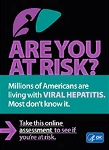CDC Issuing Recommendations for Identifying Chronic HCV Cases
Coming during Hepatitis Awareness Month and immediately after the agency's first Hepatitis Testing Day on May 19, the goal is to identify more of the people who have the disease but aren’t aware of it.
Federal government efforts to combat Hepatitis C (HCV) are increasing, with the Centers for Disease Control and Prevention staging its first Hepatitis Testing Day on May 19 and offering informational posters about HCV infection in several languages.
 HCV is the most common chronic bloodborne infection in the United States, with an estimated 2.7 million to 3.2 million people chronically infected with it, according to the agency. HCV is not efficiently transmitted sexually; public health efforts focus on people at risk for infection through injection drug use who may seek care in STD treatment facilities, HIV counseling and testing facilities, correctional facilities, drug treatment facilities, and other public health settings where STD and HIV prevention and control services are available.
HCV is the most common chronic bloodborne infection in the United States, with an estimated 2.7 million to 3.2 million people chronically infected with it, according to the agency. HCV is not efficiently transmitted sexually; public health efforts focus on people at risk for infection through injection drug use who may seek care in STD treatment facilities, HIV counseling and testing facilities, correctional facilities, drug treatment facilities, and other public health settings where STD and HIV prevention and control services are available.
People with chronic HCV are at risk for liver cirrhosis, liver cancer, and other adverse health consequences, and the mortality rate within the infected population is rising, the notice states.
CDC is publishing a notice in the May 22 Federal Register that announces its draft recommendations for identifying people with chronic HCV infection, with comments sought by June 8. The recommendations will be available at www.regulations.gov in Docket No. CDC-2012-0005.
The cirrhosis caused by hepatitis C can lead to a condition that can prevent the liver's ability to filter toxins from the body as a healthy liver normally would. These toxins can reach the brain, leaving patients faced with a condition called hepatic encephalopathy, which can be hard to diagnose because episodes can strike at different times, with different levels of severity and a wide range of symptoms. It may first cause mild confusion, poor concentration, and poor judgment but progress to disorientation, severe personality changes, slurred speech, and even coma.
CDC's Division of Viral Hepatitis seeks comments about data sources and studies on the burden of HCV morbidity; how many people living with HCV are unaware of their infection status; the benefits and harms of HCV testing, care, and treatment; and community settings where testing should be concentrated. It also asks what other factors should be considered in developing final recommendations.
The division held a live Twitter chat May 17 (CDChep) with the director of the National Center for HIV/AIDS, Viral Hepatitis, STD, and TB Prevention to discuss Hepatitis Testing Day, available resources, and a new Hepatitis Risk Assessment.